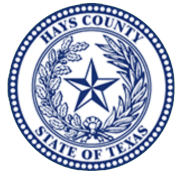Mental Health Court
Introduction
The Hays County Mental Health Court program is dedicated to promoting early identification of defendants with mental health, substance use, and/or intellectual or developmental challenges. This program is overseen by Judge Elaine Brown in County Court at Law #3. By providing access to research-based treatment options, we aim to reduce involvement in the criminal justice system and support individuals in their journey toward recovery. We strive to reduce recidivism and support individuals in achieving stability by fostering collaboration between the courts, treatment providers, and community resources.
Referral Process:
Referrals for our program can be made by clicking the “Referral Link” below and completing the form. Referrals are frequently submitted by the following individuals:
- Jail personnel
- Attorneys
- Judges
- Law enforcement officers
- Family members
- Self-referrals
- Community service providers
- District Attorney Office
Services offered:
We connect participants to individualized, evidence-based treatment plans that include:
- Case management to provide ongoing support, living skills training, connection to resources, supported employment, supported housing, and application for benefits and ID recovery
- Counseling services to address emotional and behavioral challenges, address and process trauma, learn coping skills, and increase resiliency
- Psychiatry services to assist in medication management and address symptomology

Kaimi Mattila and Judge Elaine Brown
Mental Health Court Administrator and Mental Health Court Judge
Judge Elaine Brown is the judge for Hays County Court at Law #3, Mental Health Court. Judge Brown received her law degree from Texas Tech University School of Law. She also has a Masters Degree in Psychology and became a Licensed Professional Counselor in 2011. Judge Brown served on the Board of the Hays County Bar Association for over 5 years and is the current past president. Judge Brown has been involved with creating opportunities to increase mental health awareness in the community and has served as the co-chair of the Behavioral Advisory Team in Hays County. Judge Brown frequently speaks at community events around Hays County and has advocated for more education and funding to address mental health in Hays County.
Address: 712 S. Stagecoach Trail
San Marcos, Texas 78666
Phone: 512-757-0795
Email:
kaimi.mattila@hayscountytx.gov
Mission
The mission of the Mental Health Court is to promote early identification of defendants with mental health, substance use, intellectual, and developmental challenges and provide access to treatment to reduce involvement in the criminal justice system. The Mental Health Court combines treatment and judicial monitoring to achieve long-term stability and self-sufficiency by providing a continuum of care that holds defendants accountable and assists them in becoming law-abiding citizens, and successful members of the community.
Purpose
The purpose of the Mental Health Court is to provide participants with an alternative to incarceration. The MHC provides a structured link between treatment, rehabilitation, social support services, and the criminal justice system to enhance the participant's quality of life, protect public safety and more effectively utilize public resources.
Program Goals
- Early identification of individuals at incarceration and at all intercept points of the criminal justice system.
- Identification and coordination of access to treatment, transportation, housing and support services for inmates facing mental health, substance use, and IDD disorders
- Ensure that clinically appropriate services are provided to individuals with mental health challenges and that effective program evaluation and outcome measurements are used to gauge the effectiveness of the program.
- Collaborate and establish partnerships with other community agencies that will expand the availability of services and resources.
- Increase treatment compliance of the Mental Health Court participants through judicial monitoring, intensive case management and supervision.
Eligibility Criteria
Defendants may be eligible for the MHC if they have an active misdemeanor or felony case and are diagnosed with a mental health, substance use, or IDD disorder. If there is a felony case pending, this is something that would need to be discussed and negotiated between the prosecution and legal counsel and agreed upon. Eligibility criteria is:
- Hays County Resident (case by case basis if out of county)
- 17 Years of Age or Older
- Diagnosed with a Mental Health Disorder such as Schizophrenia, Schizoaffective Disorder, Major Depressive Disorder, Generalized Anxiety Disorder, Post-Traumatic Stress Disorder. Substance use disorders and intellectual and developmental disabilities are also diagnoses that are considered for Mental Health Court.
- Misdemeanor Offense(s) or Felony Offense(s)
- Link between the mental health/substance use/IDD disorder and the current offense
- Assaultive offenses will be considered on a case-by-case basis
- No past or current charge of a sex offense
- No substantial history of violent offenses
- Competent
- Pre- or Post-Adjudication
Mental Health Court accepts referrals from all sources, judges, defense attorneys, probation officers, the jail, treatment providers or family members. MHC requires an Attorney Permission form be submitted (see exhibit A). Once the document is submitted to MHC staff, a pre-screening of defendant’s offense history will be completed. Defendant will be contacted to schedule a screening appointment with MHC Staff. If someone other than the defendant’s attorney is referring to the MHC, staff will contact the defendant’s attorney to request permission to schedule a screening and explain program requirements.
Find it Fast
Hays County, Texas
Main County Mailbox:
712 S. Stagecoach Trail
San Marcos, Texas 78666
Main Number: 512-393-7779
Connect with us!
©Copyright 2023-24 Hays County, Texas | Website by Munission









